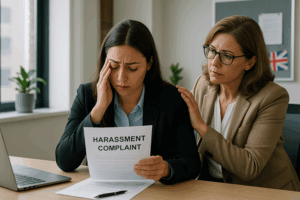Accused of sexual harassment at work: Legal rights & defence

It doesn’t always start with an inappropriate gesture. Sometimes, it’s a misunderstanding, a glance, or a comment taken out of context. Yet being accused of sexual harassment at work can disrupt careers within days. In the UK, the Equality Act 2010 defines sexual harassment as unwanted conduct of a sexual nature that violates someone’s dignity or creates an intimidating, hostile or offensive environment. Whether accusations are accurate or unfounded, knowing your rights and response strategies proves essential. From the moment allegations arise, seeking advice from employment law specialist solicitors can make all the difference.

Key Takeaway: How can someone effectively respond to being accused of sexual harassment at work?
Continue reading to learn how to protect yourself when accused of sexual harassment at work through strategic legal defence.
What should you do immediately after being accused of sexual harassment?
Being accused of sexual harassment can be unsettling, but your response must remain measured. Acting hastily or emotionally can worsen the situation. The following steps can help you take control early and protect your position:
- Do not contact the complainant, even to clarify the situation; this could be misinterpreted.
- Read carefully any documents provided by your employer, including the complaint, HR letters or invitations to meetings.
- Make detailed notes of key facts: date of the alleged incident, location, context, and any witnesses present.
- Avoid discussing the case informally with colleagues; confidentiality matters.
- Seek legal advice from an employment solicitor as soon as possible to ensure your rights in workplace investigations are respected from the outset.
How you respond in the first hours and days can shape the outcome of the entire process.
What are your rights during a workplace investigation?
A disciplinary investigation can be stressful, but it must follow clear procedures. As someone accused of sexual harassment, you have specific rights in workplace investigations that your employer is legally obliged to uphold. Knowing these rights is essential to ensure a fair and lawful process.
You are entitled to:
- Be clearly informed in writing of the allegations made against you.
- Be accompanied during any disciplinary meetings by a colleague, trade union representative or solicitor.
- Respond to the allegations and present your own evidence or version of events.
- Expect a fair and impartial investigation, conducted confidentially and in line with the principles of natural justice.
- Challenge any procedural irregularities or breaches of due process.
If any of these rights in workplace investigations are denied or mishandled, it is important to raise the issue with your legal representative. The integrity of the process is just as important as the outcome.
How to defend yourself against a false sexual harassment misconduct allegations?
Being accused of sexual harassment without valid grounds requires a clear and methodical defence strategy. Sometimes, sexual harassment misconduct is confused with inappropriate behaviour that does not amount to harassment, making it important to properly assess the facts.
To defend yourself effectively:
- Gather all possible evidence such as emails, messages, witness statements, and contextual information that demonstrate no intent or inappropriate conduct.;
- Highlight any misunderstandings or disproportionate reactions to the alleged behaviour.
- Assert your rights in workplace investigations, demanding a fair and impartial process.
- Resist any premature judgement or sanctions before the investigation concludes.
- Consult your solicitor to assess whether any disciplinary action could amount to unfair dismissal for harassment.
A false accusation can be challenged successfully, provided you remain proactive and well-supported throughout the procedure.
How to appeal disciplinary sanctions or unfair dismissal for harassment?
If you have been accused of sexual harassment and face a disciplinary sanction or dismissal, understanding appeal rights proves vital for effective challenge strategies. A dismissal based on sexual harassment misconduct can sometimes constitute unfair dismissal for harassment, especially when internal procedures were not properly followed.
To protect your interests:
- Ensure that the disciplinary process respected your rights in workplace investigations.
- Submit an internal appeal within your organisation, clearly setting out your arguments.
- Seek advice from a specialised employment solicitor to assess the dismissal’s validity and consider legal action before an Employment Tribunal.
- Respect legal deadlines. You should typically act within three months of receiving the dismissal notice.
- Aim to obtain compensation or reinstatement, depending on the evidence and circumstances.
With proper information and support, it is possible to successfully appeal an unfair dismissal for harassment following a sexual harassment allegation.
What should you do if you acknowledge innapropriate behaviour?
Acknowledging that you may have behaved inappropriately is an important step towards resolving a sexual harassment misconduct allegation. Rather than denying it outright, taking responsibility can help facilitate a more favourable outcome.
Recommended steps include:
- Clearly admitting to the behaviour without downplaying its impact.
- Offering a sincere apology to the person affected, if appropriate and possible.
- Proposing to participate in mediation or support provided by HR.
- Committing to undertake training on sexual harassment to prevent recurrence.
- Preparing to accept a proportionate sanction, while remaining open to dialogue.
Taking this approach can reduce disciplinary consequences and help restore a respectful working environment.
How to prevent a sexual harassment accusation at work?
The best way to protect yourself from the risk of being accused of sexual harassment is to maintain exemplary and respectful conduct from the outset. Prevention helps avoid misunderstandings and conflicts.
Below are some good practices to follow:
- Know and adhere to your employer’s policies on sexual harassment and expected behaviour.
- Attend mandatory or recommended training to understand the boundaries of acceptable conduct.
- Be mindful of your words and actions; avoiding any behaviour that could be seen as sexual harassment misconduct.
- Keep records of important professional communications to demonstrate your conduct if challenged.
- Report concerns or conflicts promptly to HR or a manager.
Prevention is the most effective way to safeguard your career and maintain a healthy workplace environment.
Should you contact an employment solicitor if accused of sexual harassment at work?
If you’ve been accused of sexual harassment, it’s important not to wait until a disciplinary hearing is scheduled to seek legal support. Whether the allegation involves a single incident or a broader pattern of sexual harassment misconduct, early legal advice can help you understand your position and protect your rights.
An experienced solicitor can:
- Advise you on your rights in workplace investigations.
- Help you prepare a written statement and gather relevant evidence.
- Accompany you during disciplinary meetings or advise you behind the scenes.
- Evaluate whether your employer has followed proper procedures.
- Support you in the event of a potential unfair dismissal for harassment.
Legal representation is not a sign of guilt; it’s a vital tool to ensure that your version is heard, your rights are respected, and that the process is fair.
FAQs
- What distinguishes sexual harassment from sexual misconduct at work?
Sexual harassment violates dignity or creates hostile environments under the Equality Act 2010, while sexual misconduct may involve inappropriate behaviour that does not meet legal harassment threshold. - Can I be accused of sexual harassment without intending harm?
Yes, UK law focuses on impact on complainants rather than accused persons’ intent, making sexual harassment misconduct possible even without deliberate harmful intent. - What should I do when facing false sexual harassment accusations?
Request a thorough investigation, seek specialist solicitor advice immediately, challenge any unfair sanctions, and assert rights in workplace investigations throughout proceedings.
Being accused of sexual harassment at work represents challenging situations requiring calm and precision. Knowing your rights in workplace investigations and consulting a specialist workplace harassment solicitor provides your best defence against both false and substantiated allegations.
Protect your career and reputation!
Qredible’s network of specialist employment solicitors understands exactly how to defend your rights in workplace investigations and challenge unfair dismissal for harassment through strategic legal representation.
KEY TAKEAWAYS
- Understanding rights in workplace investigations proves essential for anyone accused of sexual harassment, ensuring fair treatment and proper procedural compliance throughout disciplinary processes.
- Early solicitor consultation provides strategic defence planning against sexual harassment misconduct allegations while protecting against unfair dismissal for harassment through procedural failures.
- Prevention through professional conduct and policy compliance remains the most effective strategy for avoiding sexual harassment misconduct accusations while maintaining career security and workplace reputation.
Articles Sources
- legislation.gov.uk - https://www.legislation.gov.uk/ukpga/2010/15/contents
- acas.org.uk - https://www.acas.org.uk/sexual-harassment-at-work
- gov.uk - https://www.gov.uk/employment-tribunals/sexual-harassment-claims
- acas.org.uk - https://www.acas.org.uk/code-of-practice-on-disciplinary-and-grievance-procedures
Do you need a solicitor?
Find a solicitor on Qredible in just a few easy steps

















